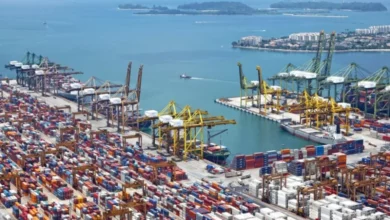
10 Factors Affecting the Growth of Commerce in Nigeria
Factors Affecting the Growth of Commerce in Nigeria – Nigeria, located in West Africa, is the most populous country in Africa and has a rapidly growing economy. Over the past decade, there has been a significant growth in commerce in Nigeria, driven by factors such as increasing population, urbanization, and rising income levels. The Nigerian economy is diverse, with a significant contribution from sectors such as oil and gas, telecommunications, banking, and consumer goods.Information Guide Nigeria
The country’s strategic location and abundance of natural resources also make it an attractive destination for foreign investment. Despite facing challenges such as inadequate infrastructure, corruption, and security issues, Nigeria’s commerce sector continues to grow and is expected to continue to do so in the future. The growth of commerce in Nigeria is key to the overall economic development of the country, providing employment, income, and opportunities for the population.
👉 Relocate to Canada Today!
Live, Study and Work in Canada. No Payment is Required! Hurry Now click here to Apply >> Immigrate to CanadaRead Also: 10 Factors Affecting the Productivity of Pasture in Nigeria
What is the Growth of Commerce?
The growth of commerce refers to the expansion and increase in the volume and variety of goods and services exchanged in trade between countries or regions. This can be measured by various economic indicators such as gross domestic product (GDP), gross national product (GNP), and the balance of trade. The growth of commerce can be driven by factors such as technological advancements, increased global interconnectedness, and favorable economic policies.Factors Affecting the Growth of Commerce in Nigeria
Types of Growth in Commerce
There are several types of growth in commerce, including:
- Acquisitive Growth: This occurs when a business expands through acquisitions, such as purchasing other companies or merging with them.
- Market Penetration: This occurs when a business increases its market share in a specific market through increased sales and marketing efforts.10 Best University In Nigeria To Study Journalism
- Market Development: This occurs when a business enters into new markets, either domestic or international, to expand its customer base.
- Product Development: This occurs when a business introduces new products or services to its existing market.
- Diversification: This occurs when a business enters into new markets or industries that are unrelated to its existing products or services
Read Also: 10 Factors affecting the size of Labour Force in Nigeria
Advantages of Growth in Commerce
Growth in commerce can bring many advantages, including:
- Increased Job Opportunities: As businesses expand and new ones are created, more jobs become available, helping to reduce unemployment.
- Higher Standard of Living: Economic growth can lead to increased incomes and a better standard of living for individuals and families.10 Best Universities In Nigeria To Study Surveying And Geoinformatics
- Greater Choice: Increased competition among businesses can lead to a wider range of products and services available to consumers.
- Increased Exports: As companies grow, they may expand their operations to other countries, leading to increased exports and a boost to the national economy.NYSC Portal
- Tax Revenue: Growing commerce can lead to an increase in tax revenue for governments, which can be used for public services and infrastructure.
Read Also: 10 Factors Affecting Money Supply in Nigeria
The Growth of Commerce and the Nigerian Society
Nigeria has a long history of trade and commerce, dating back to ancient times when various ethnic groups such as the Yoruba and Hausa traded goods such as cloth, metal goods, and slaves. In the 19th century, the British colonized Nigeria and established a cash crop economy, primarily focused on exporting palm oil, peanuts, and rubber. This led to the growth of a market economy and the development of businesses and trade networks.
In the post-colonial period, Nigeria’s economy continued to grow, driven by the discovery of oil in the 1950s. The country became one of the leading oil-producing nations in the world, and the oil industry became a major contributor to the country’s GDP. However, Nigeria’s economy became heavily dependent on oil, and the government’s mismanagement of oil revenues led to economic stagnation and corruption.JAMB Portal
👉 Relocate to Canada Today!
Live, Study and Work in Canada. No Payment is Required! Hurry Now click here to Apply >> Immigrate to CanadaIn the 21st century, Nigeria has been working to diversify its economy and promote economic growth through various initiatives such as the Nigerian Industrial Revolution Plan and the National Enterprise Development Program. These efforts have led to the growth of small and medium-sized enterprises and the development of new industries such as information technology and telecommunications. Additionally, Nigeria has also focused on increasing foreign trade and investment, particularly with countries in Africa and Asia.
In recent years, Nigeria has faced some economic challenges, including a devaluation of its currency and a drop in oil prices. However, the country has also seen an increase in e-commerce, which has been driven by increasing access to the internet and mobile technology. This growth in e-commerce has created new opportunities for businesses and entrepreneurs and has the potential to drive economic growth in the future.
Read Also: 10 Factors Affecting Human Capital Development In Nigeria
Factors affecting the Growth of Commerce in Nigeria
Several factors affect the growth of commerce in Nigeria, some of which include:
- Currency Devaluation: Nigeria’s currency devaluation problem can also affect the growth of commerce by making it difficult for businesses to operate effectively.JAMB Result
- Foreign Exchange: The scarcity of foreign exchange can also affect the growth of commerce by making it difficult for businesses to import goods and services.
- Lack of Market Access: Limited access to markets can make it difficult for businesses to reach customers and sell their products and services.
- Limited access to Technology: Many businesses in Nigeria lack access to modern technology, which can impede their ability to compete in the global marketplace.200 romantic love message for her
- Low Levels of Education and Skill Development: A lack of education and skill development can make it difficult for businesses to operate effectively and compete in the global marketplace.
- Limited access to Business Training and Support: Many businesses in Nigeria lack access to training and support, which can make it difficult for them to grow and expand.
- Limited access to Capital: Many businesses in Nigeria lack access to capital, which can make it difficult for them to invest in growth and expansion.
- Limited access to Global Market: Nigeria’s businesses often have limited access to the global market, which can make it difficult for them to compete and grow.105 Beautiful Good Morning Messages For Her or Him
- Lack of Standardization and Regulation: A lack of standardization and regulation can create a chaotic environment for businesses and negatively affect the growth of commerce.
- Economic Recession: Nigeria is currently facing an economic recession which is affecting the growth of commerce.
Read Also: 10 Factors Affecting Trade Union In Nigeria
Conclusion
The growth of commerce in Nigeria is affected by various factors such as infrastructure, government policies, economic stability, and corruption. To promote the growth of commerce, the Nigerian government needs to invest in infrastructure development, implement favorable policies, maintain economic stability, and tackle corruption effectively. These steps will attract investment, spur economic growth and help in the development of a sustainable commercial environment in Nigeria.
Check JAMB RESULT
Check and Confirm: How much is Dollar to Naira








